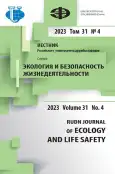Ecological situation in European cities in 2013-2023: transition to green economy
- Authors: Mironova M.N.1, Nevedomskaya A.O.1, Sotnikova V.V.1, Massarova A.R.1
-
Affiliations:
- RUDN University
- Issue: Vol 31, No 4 (2023)
- Pages: 494-509
- Section: Environmental Monitoring
- URL: https://journal-vniispk.ru/2313-2310/article/view/323915
- DOI: https://doi.org/10.22363/2313-2310-2023-31-4-494-509
- EDN: https://elibrary.ru/RLZTPY
- ID: 323915
Cite item
Full Text
Abstract
The study is devoted to the study of the relationship between the structure of the economy and the level of pollution of European cities in the context of the environmental imperative. Based on comparative statistical analysis, the level of pollution in European cities in 2013 and 2023 was considered and cities with the most and least favorable environmental situation were defined. Studied cities were divided into 7 groups by pollution index; stable trend of their location was determined through carrying out a cartographic analysis: groups of the most polluted cities are located mainly in the southeast of Europe and the least - in the northwest. Five types of cities with different trends in pollution index dynamics were identified. Based on a comprehensive synthetic analysis of cities with maximum improvement and deterioration of the environmental situation, the main factors of multidirectional dynamics are described - activity of environmental policy, sectoral structure transformation of urban economy. Main spatial trends in the environmental situation of European cities were identified: cities with positive dynamics of pollution index predominantly concentrated in the southeast, with a negative - in the east. The analysis showed that 2/3 of the largest cities in Europe improved their ecological condition mainly due to the effectiveness of environmental measures, the green political movement, the development of the tertiary and quaternary sectors in their economy.
About the authors
Marina N. Mironova
RUDN University
Author for correspondence.
Email: mironova-mn@rudn.ru
ORCID iD: 0000-0003-3799-6705
SPIN-code: 7306-3940
Candidate of Geographical Sciences, Associate Professor of the Department of Regional Economics and Geography, Faculty of Economics
6 Miklukho-Maklaya St, Moscow, 117198, Russian FederationAlexandra O. Nevedomskaya
RUDN University
Email: 1132226666@pfur.ru
2nd year student, Faculty of Economics 6 Miklukho-Maklaya St, Moscow, 117198, Russian Federation
Victoria V. Sotnikova
RUDN University
Email: 1132222997@pfur.ru
2nd year student, Faculty of Economics 6 Miklukho-Maklaya St, Moscow, 117198, Russian Federation
Alena R. Massarova
RUDN University
Email: massarova-ar@rudn.ru
ORCID iD: 0000-0002-9470-0037
SPIN-code: 1724-6141
Assistant of the Department of Regional Economics and Geography, Faculty of Economics
6 Miklukho-Maklaya St, Moscow, 117198, Russian FederationReferences
- Bobyleva S.N., Kiryushina P.A., Kudryavtseva O.V. Green economy and sustainable development goals for Russia: collective monograph. M.: Faculty of Economics of Moscow State University named after M.V. Lomonosov, 2019. 284 p. (In Russ.)
- Xuemei Bai, Timon McPhearson, Helen Cleugh, Harini Nagendra, Xin Tong. Linking Urbanization and the Environment: Conceptual and Empirical Advances. Annual Review of Environment and Resources. 2017;2:215–240. https://doi.org/10.1146/annurev-environ-102016-061128
- Ernstson H. Ecosystems and urbanization: A colossal meeting of giant complexities. Ambio. 2021;50:1639–1643. https://doi.org/10.1007/s13280-021-01516-y
- Chen X, Liu C, Yu X. Urbanization, Economic Development, and Ecological Environment: Evidence from Provincial Panel Data in China. Sustainability. 2022;14(3):1124. https://doi.org/10.3390/su14031124
- Yongchi M, Yong J. Ecosystem-based adaptation to address urbanization and climate change challenges: the case of China’s sponge city initiative. Climate Policy. 2023;23(2):268–284. https://doi.org/10.1080/14693062.2022.2131503
- Jóźwik B, Gavryshkiv A-V, Galewska K. Do Urbanization and Energy Consumption Change the Role in Environmental Degradation in the European Union Countries? Energies. 2022;15(17):6412. https://doi.org/10.3390/en15176412
- Romano B, Sette C, Zullo F, Montaldi C. Landscape Profiles, Urbanization and Environmental Protection in Europe: Is Western the Future Scenario for Eastern? Current Urban Studies. 2023;11:301–318. https://doi.org/10.4236/cus.2023.112016
- Makar SV. Accents in the development of the ecological situation in Russia during the period of economic modernization. National interests: priorities and safety. 2014;10(21(258)):11–21. (In Russ.)
- Bobylev SN, Kudryavtseva OV, Yakovleva YeYu. Regional priorities of green economy. R-Economy. 2015;2(1):148–160. https://doi.org/10.17059/2015-2-12
- Xiong X, Zhou T, Cai T. Land Use Transition and Effects on Ecosystem Services in Water-Rich Cities under Rapid Urbanization: A Case Study of Wuhan City, China. Land. 2022;11(8):1153. https://doi.org/10.3390/land11081153
- Jin P, Wang S, Yin D, Zhang H. Environmental institutional supply that shapes a green economy: Evidence from Chinese cities. Technological Forecasting and Social Change. 2023. Vol. 187(C). https://doi.org/10.1016/j.techfore.2022.122214
- Davydova IS, Gaponenko AV. The problem of air pollution in cities. Sciences of Europe. 2017;2(14):3. Available from: https://issuu.com/sciencesofeurope/docs/vol-2-no-14-14-2017/3 (accessed: 21.07.2023)
- Bityukova VR. Economic and geographical assessment of the environmental consequences of the transformation of the sectoral structure of the economy of regions and cities of Russia in 2000–2020. Proceedings of the Russian Academy of Sciences. Geographic series. 2022;(3):416–434. (In Russ.)
- Granjou C, Salomon Cavin J, Boisvert V. Researching Cities, Transforming Ecology: An Investigation into Urban Ecology Agendas. Nature and Culture. 2023;18(2):148–174. https://doi.org/10.3167/nc.2023.180202
- Sokolov RN, Rogozhina EM, Tikhomirova AD. Modern environmental policy of the European Union: the struggle for resources and the conflict of interests in various market segments. Conflictology. 2022:75–86. Available from: https://www.elibrary.ru/ item.asp?edn=necufb (accessed: 24.07.2023) (In Russ.)
- Chobotova V. The role of market-based instruments for biodiversity conservation in Central and Eastern Europe. Ecological economics. 2013;95:41–50. Available from: https://www.peeref.com/works/9060286 (accessed: 28.07.2023).
- Rebrova VV. Institutional conditions and factors of transition to green economy. Financial markets and banks. 2021;(2):33–37 (In Russ.)
- Zhalbinova SK. Ecological monitoring as an ecological and economic mechanism for nature management. Eurasian scientific association. 2019;10–4(56):301–305. Available from: https://www.elibrary.ru/item.asp?id=41385664 (accessed: 01.08.2023) (In Russ.)
- Ilyakova IE. Implementation of the best available technologies as a factor in the formation of a green economy: an institutional aspect. National Security/ nota bene. 2021. no. 5. P. 30–40 (In Russ.)
- Pollution Index by City. Numbeo. 2023. Available from: https://www.numbeo.com/ pollution/rankings.jsp (accessed: 25.06.2023).
Supplementary files









